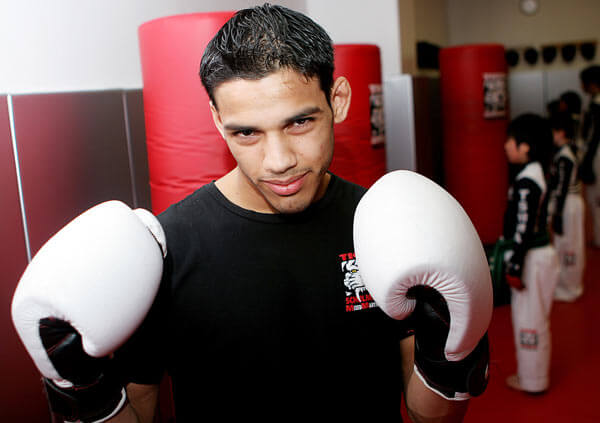By Rich Bockmann
On the way to winning his Golden Gloves title earlier this year, Julio Arce, then 21, fought through five rounds of boxing matches, including one at the Empire City Casino in Yonkers and a final match at Madison Square Garden.
Four months later, the trainer at the Tiger Schulmann’s mixed-martial arts school on Bell Boulevard in Bayside used a rear naked choke hold to win the Hester MMA Fight League title at a bout in New Jersey, which is one of 45 states that allows and regulates mixed-martial arts events.
The combat sport became popular in the 1990s due in no small part to the violent reputation earned from its matches, in which fighters combine a number of fighting styles. MMA was banned in New York state in 1997, but since then it has gained a certain level of legitimacy, and supporters are now pushing to have it legalized in New York.
“I just think it’s silly,” said the 5-foot 8-inch, 150-pound Arce. “If you’re allowed to box in New York, what’s wrong with letting MMA be a part of New York City?”
Ultimate Fighting Championship was formed in 1993 and today is the largest MMA promotion in the world. To date, the company has held 192 fight events, produced 14 seasons of a popular reality TV series and in August signed a seven-year broadcast deal with Fox Sports.
“MMA is one of the fastest-growing sports in the U.S. and one of the most popular in the world,” said Lorenzo Fertitta, chairman and CEO of Zuffa LLC, owner of UFC.
In November, Zuffa filed a lawsuit against state Attorney General Eric Schneiderman in federal court, challenging the constitutionality of the state’s ban on MMA before live audiences.
“When we acquired the UFC, we went to great lengths to invite regulation and adopt substantial safety measures,” Fertitta said. “Denying fighters the chance to exhibit their training and skills before a live audience and denying thousands of New Yorkers the ability to watch their favorite fighters perform live is not only an injustice to them, but to the local markets that would reap tremendous economic benefits from hosting competitions.”
State Assemblyman Ed Braunstein (D-Bayside) is a co-sponsor on a piece of legislation that would lift the ban.
“The way I see it is this: We just did a check of the financials on how much money it could raise. It could add $23 million to businesses in New York state,” he said. “Other states are making jobs and money, why not bring it here?”
State Sen. Tony Avella (D-Bayside) sponsored and voted for a companion bill that passed through the Senate last session.
“I came to the conclusion that it’s something the state should allow,” he said. “It’s much more strictly regulated than it was in the beginning by the industry itself. This would put it under the state Athletic Commission.”
“It’s revenue-generating,” the senator added. “We do need to raise some revenue.”
Avella said the issue has come up several times, but was never successfully passed.
Sen. Liz Krueger (D-Manhattan) was one of several who voted against the bill.
“I don’t believe we need to be expanding access to a sport that is both dangerous to the people that participate in it and continues to send messages that extreme violence is acceptable behavior to the young people who watch these sports,” she said.
Reach reporter Rich Bockmann by e-mail at rbockmann@cnglocal.com or by phone at 718-260-4574.

































